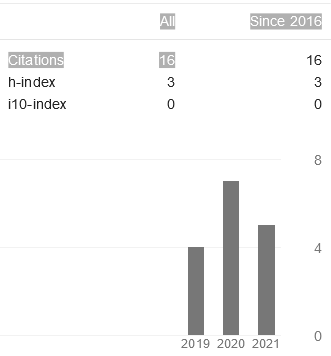Utilization of Sansevieria As a CO and HC Exhaust Gas Filter in Motorized Vehicles in Preventive Climate Change Efforts
Abstract
Motor vehicle emissions cause air pollution, such as: CO and HC gases. These two gases cause climate change and pose threats to human health, such as poisoning, and cancer. Sansevieria sp. is a plant that can absorb 107 pollutants in the air such as carbon monoxide, formaldehyde, and trichlorethylene. Based on this potential, researchers innovate to make filters based on sansevieria. This study examines the effectiveness of filtering CO and HC gases after installing filters in motorized vehicles. This research method uses a quantitative descriptive with an experimental approach. The independent variable is the composition of the number of filters and gels, while the dependent variable is the effectiveness of reducing HC and CO levels. Filter testing using a gas analyzer with a motorcycle engine speed from 1500 RPM to 9000 RPM. The results of this study showed that CO and HC emissions after being treated in sample A from 1500 RPM to 9000 RPM showed a reduction of 67% CO and 25% HC. Meanwhile, in sample B, the decrease in CO was 80% and HC was 51%. The ability of the sansevieria filter to reduce CO and HC gas emissions can be a climate change prevention effort, because it can reduce the potential for GHG due to motorized vehicles
Copyright (c) 2023 Tri Sunan Agung, Belinda Safa Salsabila Zuhri, Dedy Suprayogi

This work is licensed under a Creative Commons Attribution-ShareAlike 4.0 International License.
Authors who publish with us agree to the following terms:
- Authors retain copyright and grant the publisher right of first publication with the work simultaneously licensed under a Creative Commons Attribution License that allows others to share the work with an acknowledgement of the work's authorship and initial publication in this proceeding.
- Authors are able to enter into separate, additional contractual arrangements for the non-exclusive distribution of the proceeding's published version of the work (e.g., post it to an institutional repository or publish it in a book), with an acknowledgement of its initial publication in this proceeding.
- Authors are permitted and encouraged to post their work online (e.g., in institutional repositories, pre-prints sites or on their website) prior to and during the submission process, as it can lead to productive exchanges, as well as earlier and greater dissemination of published work





_page-00011.jpg)
